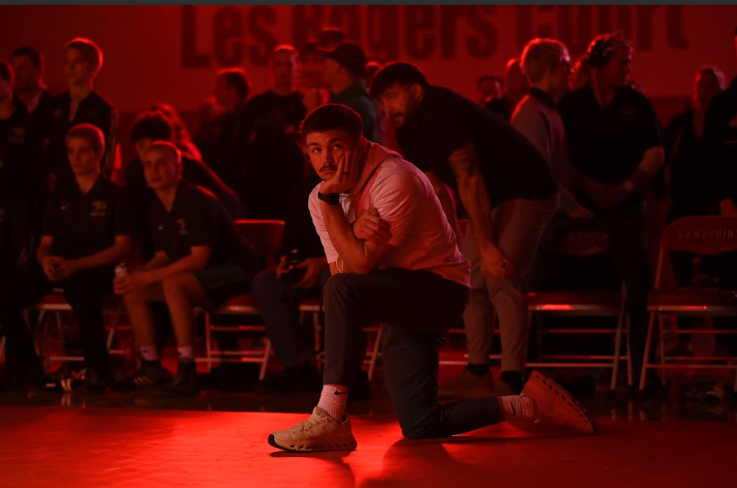Discipline, hatred of losing and attention to detail are all traits expected and learned throughout high school wrestling. A deep willingness to put their physical strength to the test everyday they step into practice is required to make it through each season.
In the long run, these are great traits to have throughout life.
However, the effect they can have on students in the moment can be harmful and difficult to maintain a healthy balance with.
Common amongst many student wrestlers is the deep obsession for perfection.
Due to the sports independent nature many wrestlers can blame themselves for any losses.
While wrestling is a team sport off the mat, on the mat the consequences are solely based on the wrestler’s actions alone.
A win culture is instilled in the brains of many of the wrestlers. And beating themselves up for a loss is very common to see, as they have no one else to blame.
This can cause many of the athletes to crave victory due to the intense blame they put on themselves alone after a loss.
“It takes such a mental toll on you,” Eli Anderson, a Moses Lake wrestler said.
Although, coaches of the sport also expect players to be a positive light in order to trust themselves whilst wrestling.
“They expect a positive attitude not only in the room but also at tournaments,” Drayden Gaither said.
Mental health is one of the biggest contributing factors to a healthy lifestyle. Finding balance between the sport, school, relationships, and personal interests can be extremely difficult because of the long hours and strict requirements to wrestle at matches.
The sport coinciding with the high school expectations or requirements for graduation can leave students very little time for anything else outside of their student athlete identities.
Injuries, especially concussions, also have a big impact on athletes’ mental health.
Concussions account for about five to ten percent of all injuries in wrestling.
Approximately one in five individuals will experience mental health problems about six months after getting an injury.
A main cause of concern for wrestlers is the weight requirements. Wrestlers have a constant battle with cutting and bulking to make it to their designated weight class. This can cause an obsession with weight and unhealthy outlook on food.
For everyone, obsession over food and weight is a downward spiral that can lead many to eating disorders or addictions to replace the satisfaction of eating food.
A study found that collegiate wrestlers have a ten to fifteen percent chance of developing a mental illness serious enough for counseling. This is two percent higher than those not in sports.
This study researched athletes at the Division 1 level. While athletes at this level of institution may have higher levels of commitment, and more on the line to be great, the similar increase in mental illness can be seen throughout the high school level as well.
Although the percentages may seem low, that’s around 46,000 student athletes more likely to get a serious mental illness. Enough to fill up an MLB stadium.
However, for many, wrestling is an outlet and a way to control themselves and strengthen their willpower.
Anyone can see that everyone on the wrestling team has an admirable amount of strength and during the season tend to lead healthy lifestyles. The coaches expect excellence, and this can lead many kids to straighten up their habits.
“My coaches expect me to be on time and laced tied up by 3:15 right after school. They expect good behavior and they expect me to be excellent,” Anderson said.
The sport also provides a sense of community and commitment for many that wouldn’t find that elsewhere.
The mental defense required is unlike anything. It teaches the participating athletes to block out anxieties, stress or other factors and focus on the objective at hand.
Similar to military training, wrestlers and soldiers are taught to take emotions out of the picture, as they have a great influence.
The Army’s World Class Athlete Program has even set up multiple facilities world wide for wrestling. By combining weight training, and calisthenics, one of the best and most recommended ways to prepare for the military bootcamp is wrestling.
The Air Combat Command also touches on this topic and states that wrestling goes hand-in-hand with the air forces values, and physical goals for its recruits.
This may seem like an odd practice, but it is a very useful skill in the world allowing people to stay calm and collected no matter how sad, angry or scared they may be. This allows people to take control of their lives instead of letting their emotions control them.
Time management is also crucial for all wrestlers. The sport shows them what their true priorities are, and forces them to cut out anything that takes time away from those priorities. This skill is one of the most important in the workforce for any career. It is also something that many high school students lack.
Wrestling allows the participants to leave their outside stressors in the locker room, and focus on the present moment.
Arguments over this unique sport are made for both sides, whether or not it’s good for players’ mental health or not.
However, wrestling is an art form that has benefitted many students and gives them a free and supportive environment to learn their physical strengths, as well as mental limits.
Wrestling overall depends on the individual’s experience. Various factors can affect this experience such as coaches, teammates, the environment and level of competition.
It can significantly boost self-esteem by fostering self-discipline, endurance and confidence. The required and rigorous daily training and strategic thinking allow players to develop extreme discipline that isn’t commonly found in other sports. This can in turn enhance overall well-being, especially in areas associated with these personality traits such as the workforce. A great sense of accomplishment can come from victories, personal achievements, or growth within the sport. The support and kinship that comes from the team and coaches can also create a sense of family for wrestlers.
The intense pressure to perform and succeed can negatively affect wrestlers as well. Burnout and overall stress can become all too much for one person, causing negative side effects. The emphasis on dieting and weight classes often results in intense cutting practices that can deter physical health as well. Injuries can also lead to deep frustration and depression.
In all, it is crucial for wrestlers to have a balanced lifestyle during the season with support systems and boundaries in place to address and limit mental health issues that may arise.
Many sports psychologists or school counselors are trained and aware of these arising issues, and are a great way for wrestlers to reach out and get the help they need to have a great season.
They address all concerns, and can come up with solutions to help with time management.
FInding a balance with school work can be one of the hardest parts of the sport.
School Counselors can also help with this, by talking with teachers, coaches and parents to find a schedule that benefits the student while also benefiting the wrestler.
Balance is key to a wrestler mindset.

